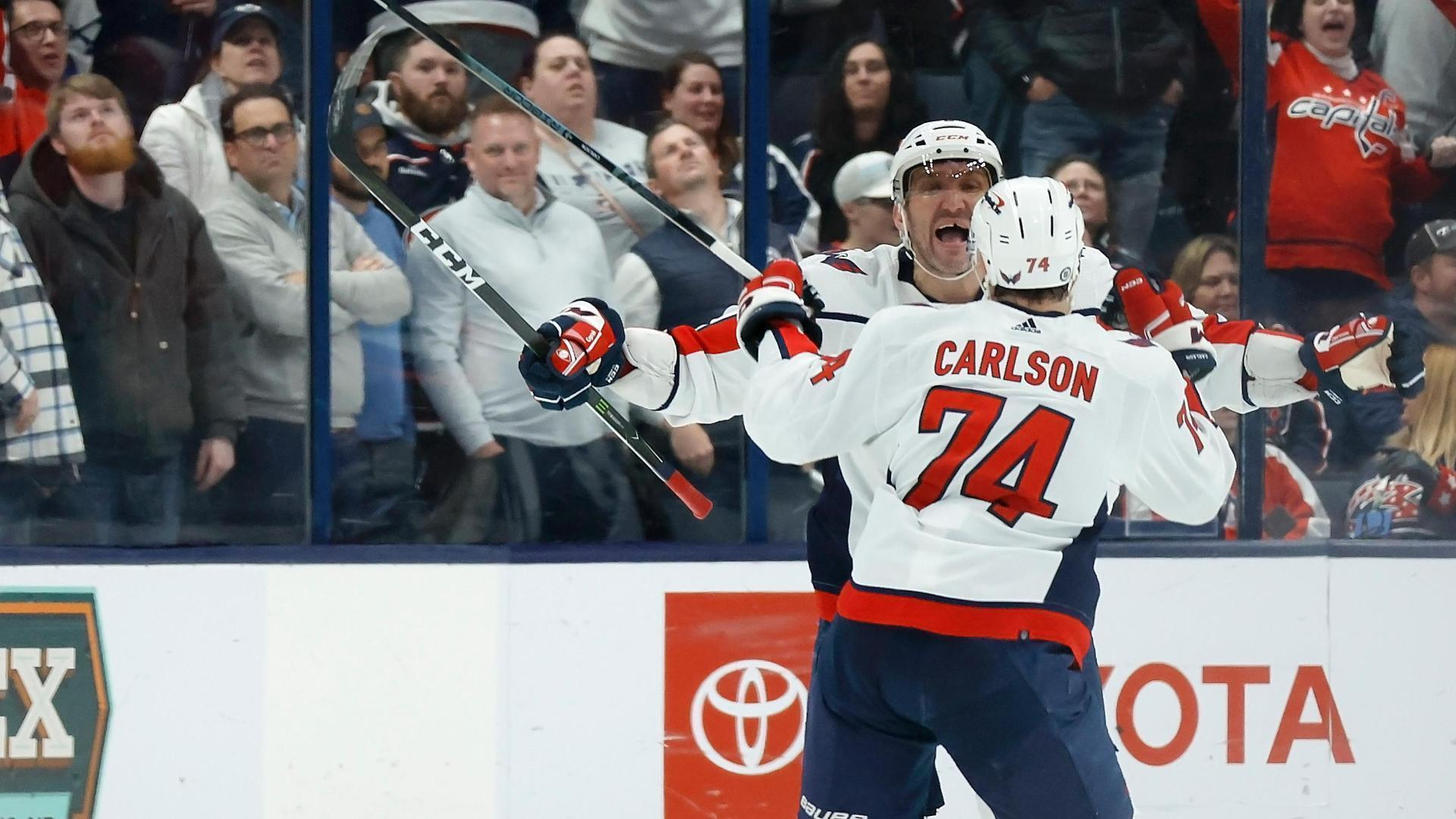In a thrilling moment during the Capitals game, Alex Ovechkin’s overtime goal sent shockwaves through the arena, especially amidst the NHL playoff controversy surrounding the officiating. The game, featuring the Montreal Canadiens and the Washington Capitals, was not just another playoff match; it became a focal point for debates on hockey referee decisions that could potentially alter the outcome of a series. Just seconds before Ovechkin’s winning goal, a contentious play involving Kaiden Guhle and Patrik Laine set the stage for what many are labeling a blown call. While fans erupted in jubilation over Ovechkin’s remarkable skill to clinch the victory, analysts expressed their disbelief at the officiating that allowed the play to unfold. This game will surely be remembered not just for the sensational goal but also for the ensuing discussions on fair play and the integrity of NHL officiating.
The matchup between the Canadiens and the Capitals delivered more than just high-paced hockey; it sparked a whirlwind of discussions on the intricacies of officiating within the NHL playoffs. With Alex Ovechkin’s miraculous goal in overtime, fans are left reflecting on the impact of referee decisions and the nuances of hockey rules. The critical moment leading up to Ovechkin’s goal raises questions about how plays are managed and the interpretations of obstruction and icing calls. As analysts dissect the event, it’s clear that this match has become emblematic of broader issues in the league regarding officiating consistency. Whether you call it the Ovechkin clutch moment or the controversial call that preceded it, this game has certainly carved a place in playoff history.
Controversial Referee Decisions in the Capitals vs. Canadiens Game
The first game of the NHL playoff series between the Montreal Canadiens and the Washington Capitals was marked by a contentious officiating decision that ultimately changed the outcome of the game. The situation escalated after a crucial moment involving players Kaiden Guhle and Patrik Laine, as well as defenseman Matt Roy. Guhle attempted to clear the puck, aiming at Laine’s stick, yet a hard check from Roy prevented Laine from making contact. The referees ruled that this instance did not constitute a valid clearance, sparking outrage from fans and analysts alike.
As the game progressed, frustration among the Canadiens’ supporters grew, highlighted by comments from analysts such as Maxim Lapierre, who argued the need for consistency in officiating standards. When critical decisions skew the flow of a playoff game, the integrity of the sport comes into question. Debates about the role of referee oversight become common during high-stakes matchups like these, and the discordant views on the rules can overshadow the athletes’ performances that fans came to enjoy.
The Impact of Ovechkin’s Overtime Goal on Playoff Dynamics
Alex Ovechkin’s overtime goal represented a pivotal moment in this NHL playoff series, bringing victory to the Capitals but also raising questions about the fairness of the game. The goal was preceded by the contentious no-call that led to Laine’s inability to play the puck. Ovechkin’s performance illustrates not just his skill but also the magnitude of pressure that comes with playoff competition. The Capitals’ star player once again proved why he is regarded as one of hockey’s elite, but the circumstances leading to his goal sparked significant debate among fans and analysts.
This overtime win could shift the dynamics of the entire series, giving the Capitals a psychological edge. With Ovechkin’s winning goal overshadowed by the officiating errors, the Canadiens must regroup and assess their strategies carefully. In high-stakes playoff environments, the perception of referee decisions can create lasting effects on team morale and game strategy, especially when attention is drawn to controversial plays. Such is the reality of the NHL postseason, where each game is closely scrutinized, and the outcomes can hinge on a single moment.
NHL Playoff Controversies: Learning from the Past
The controversy surrounding the Capitals vs. Canadiens game is not isolated; it is part of a larger narrative within NHL playoffs, where referee decisions often become the center of attention. Historically, contentious calls have sparked debates, with fans lamenting perceived injustices and analysts dissecting every officiating decision. From missed penalties to ambiguous interference calls, the scrutiny placed on officials influences the way games are played and interpreted by fans.
As the league moves forward, it’s essential to consider the lessons learned from past controversies. Establishing clearer guidelines for officiating and enhancing communication among officials could improve the overall game experience. By addressing the issues that arise during critical playoff moments, the NHL can uphold its commitment to fairness and integrity in the sport. Ultimately, every playoff game should be determined by the players, and continuing controversy only detracts from the excitement of championship hockey.
Key Players in the Capitals vs. Canadiens Game: A Breakdown
In the clash between the Montreal Canadiens and the Washington Capitals, individual players emerged as pivotal figures in the unfolding drama. Star player Alex Ovechkin, known for his goal-scoring prowess, ultimately clinched the victory for the Capitals with his overtime goal. His presence on the ice changes the dynamic for his team, instilling confidence and often leading to clutch moments such as the one witnessed during this matchup. On the other hand, the efforts of Guhle and Laine showcased the importance of teamwork and strategic positioning, even if the outcomes didn’t favor the Canadiens.
However, the performance of the referees also factors heavily into the analysis of this game. Their decisions directly influenced the flow of play and the opportunities available to both teams. Discrepancies in officiating can shift the focus from player performances to rule interpretations, which is a disheartening reality for both players and fans. With such contentious moments at the forefront of discussions, it’s clear that every player’s effort is magnified during the playoffs, but referee consistency remains a crucial element that cannot be overlooked.
Analyzing the Role of Officiating in Modern Hockey
The controversy surrounding the officiating in the NHL playoffs, especially during games like the Capitals and Canadiens matchup, emphasizes the critical role that referees play in the game. In high-stakes encounters, every moment is magnified, and seemingly small decisions can have monumental consequences for the teams involved. The balance that referees must maintain is a challenging one, as they interact with the intense emotions of players while interpreting the rules laid before them.
As modern hockey evolves, so too should the approach to officiating. Enhanced training programs and modern technology for officiating could assist in providing more precise enforcement of the rules, especially during playoff games where emotions and stakes are extraordinarily high. By using video reviews and improving communication between on-ice officials and their supervisors, the league can encourage a more transparent and fair environment for the players and their performances, ultimately allowing the game itself to shine.
Fans’ Reactions to Ovechkin’s Winning Goal
The response from fans regarding Alex Ovechkin’s overtime-winning goal has been overwhelmingly mixed. Many Capitals supporters celebrated the victory, with Ovechkin’s goal seen as a hallmark moment potentially leading the team to advancement in the playoffs. However, Canadiens fans expressed their outrage over what they viewed as an unfair advantage granted by the officiating that preceded the goal. This fan dichotomy exemplifies how one play can polarize opinions and ignite fierce loyalty among supporters.
In the digital age, social media acts as an immediate platform for fans to voice their feelings, leading to animated discussions surrounding referee decisions. The aftermath of Ovechkin’s goal and the dubious officiating decisions are already fodder for debate, further fueling loyalty among Canadiens fans and enthusiasm for the Capitals. Understanding the emotional landscape of the fanbase is crucial for teams, as they navigate the highs and lows of playoff hockey, driven by the exciting and sometimes burdensome decisions of officials.
The Psychological Effects of Controversy on Players
The psychological impact on players in the wake of a controversial game cannot be understated. Following the Capitals and Canadiens clash, players must cope with the emotional ramifications of officiating decisions while bouncing back from the outcome. For some, like Ovechkin, the pressure can manifest as motivation, focusing energy into their performance in subsequent games. However, for others, especially from the Canadiens, the fallout from perceived injustices could lead to doubt and frustration.
As such, mental resilience becomes a key component for athletes in the playoff environment. Teams often rely on sports psychology techniques to help players process emotions and maintain a competitive edge. The ability to move forward after a controversial game like this one will shape each player’s mental state as they progress through this series and beyond. Hockey is not just a physical contest but a mental battle as well, where how players manage their experiences can significantly affect their performance on the ice.
Evaluating Team Strategies Post-Game Controversies
Following a game laden with controversy, such as the Capitals’ clash with the Canadiens, teams must evaluate their strategies moving forward. The Canadiens, facing a difficult hurdle, must address not only tactical adjustments but also the need to bolster team morale to recover from the emotional impact of the game. Understanding how to respond to adverse officiating can define their approach in future matchups, reinforcing the importance of adaptability in high-pressure situations.
For the Capitals, the challenge lies in maintaining momentum after a contentious victory. While celebrating Ovechkin’s winning goal, they must also prepare for possible scrutiny in future games, knowing that the playoff atmosphere can shift quickly. Strategic planning in response to the unique dynamics created by officiating can empower both teams to turn challenges into opportunities as they progress in the playoffs. Ultimately, every game serves as a building block, with each decision influencing the path ahead.
Reflections on the Future of NHL Officiating Beyond 2025
As the NHL continues to evolve, conversations surrounding the future of officiating must take center stage. The events of the Capitals vs. Canadiens game underline the importance of ensuring that every play is managed with fairness and clarity. There is a growing call for systemic changes in officiating to match the expectations of players and fans alike in 2025 and beyond. This could involve implementing advanced tools, further training for officials, and possibly even revised protocols for reviewing calls that can dramatically impact momentum.
Operational excellence in officiating will establish a more equitable playing field, essential for the integrity of the sport. As teams like the Canadiens and Capitals navigate the complexities of playoffs, the evolution of the officiating process must parallel this growth. Embracing technology, fostering clear communication, and ensuring consistency will form the backbone of enhanced officiating standards. As discussions advance in the league, the hope is that such developments ensure that NHL playoff hockey is decided by skill, determination, and the indomitable spirit of competition, rather than contentious calls.
Frequently Asked Questions
What happened during Alex Ovechkin’s overtime goal against the Montreal Canadiens?
In a thrilling NHL playoff game, Alex Ovechkin scored a controversial overtime goal that ended the match between the Capitals and the Montreal Canadiens. The goal came after a disputed icing call, which many analysts felt could have changed the game’s outcome.
Why was there controversy surrounding the refereeing in the Capitals game against the Montreal Canadiens?
The controversy stemmed from a pivotal play involving Kaiden Guhle’s attempt to clear the puck. His clearance was waved off due to a hard hit on Patrik Laine by defenseman Matt Roy. Commentators, including Maxim Lapierre and Renaud Lavoie, criticized the officiating, arguing that the play demonstrated a lack of consistency in the NHL’s referee decisions.
How did the Canadiens’ players react to Alex Ovechkin’s winning goal in overtime?
Players and analysts from the Canadiens organization expressed frustration over the refereeing decisions leading up to Alex Ovechkin’s overtime goal. They believed that Laine’s inability to play the puck due to obstruction should have warranted a penalty, impacting the play before Ovechkin’s decisive score.
What role did the icing call play in Alex Ovechkin’s overtime win?
The icing call was crucial as it set up the face-off in the Canadiens’ zone, where Alex Ovechkin ultimately scored the winning goal in overtime. Many viewers and analysts disagreed with the call, arguing it disrupted the flow of the game and unfairly favored the Capitals.
Could Alex Ovechkin’s winning goal have been avoided if the referees made a different decision?
Yes, if the referees had ruled differently on the play involving Laine and Roy, it might have prevented the setup for Alex Ovechkin’s winning goal. The lack of a penalty for interference or obstruction could have altered the momentum, possibly leading to a different outcome in the game.
What comments were made by analysts regarding the referees’ decisions in the Capitals game?
Analysts Maxim Lapierre and Renaud Lavoie were vocal about the referees’ questionable decisions, stating that the rules were clear-cut. They believed the game’s flow was hindered by the icing call and suggested that better officiating could have led to a fairer contest.
How did the Capital One Arena crowd react to Alex Ovechkin’s overtime goal?
The crowd at Capital One Arena erupted in celebration when Alex Ovechkin scored the overtime goal, despite the surrounding controversy. The excitement of the moment was palpable, yet it was mixed with discussions about the officiating that led to the goal.
What implications does the overtime goal by Alex Ovechkin have for the series against the Montreal Canadiens?
Alex Ovechkin’s overtime goal could have significant implications for the Capitals’ confidence and momentum in the series. A win in the playoffs, especially one punctuated by controversy, can energize a team, setting a critical tone for the subsequent games against the Canadiens.
| Key Points |
|---|
| Alex Ovechkin scored the game-winning goal in overtime against the Montreal Canadiens. |
| The goal was controversial and resulted from a disputed icing call. |
| Kaiden Guhle attempted to clear the puck but hit a teammate, Patrik Laine, causing confusion. |
| Defenseman Matt Roy’s hit on Laine was deemed important in leading to the icing call being waved off. |
| Analysts expressed disbelief over the officiating during the post-game show, questioning rules about obstruction. |
Summary
Alex Ovechkin’s overtime goal was a pivotal moment in the first game of the playoffs, but it also sparked controversy due to questionable officiating. The decision to wave off an icing call after a hit on Patrik Laine drew criticism from analysts and fans alike, highlighting the ongoing debate about rule interpretations in the NHL. As the Capitals celebrated their victory, the discussions surrounding the officiating decisions, particularly in high-stakes games, continued to reverberate in the hockey community.



